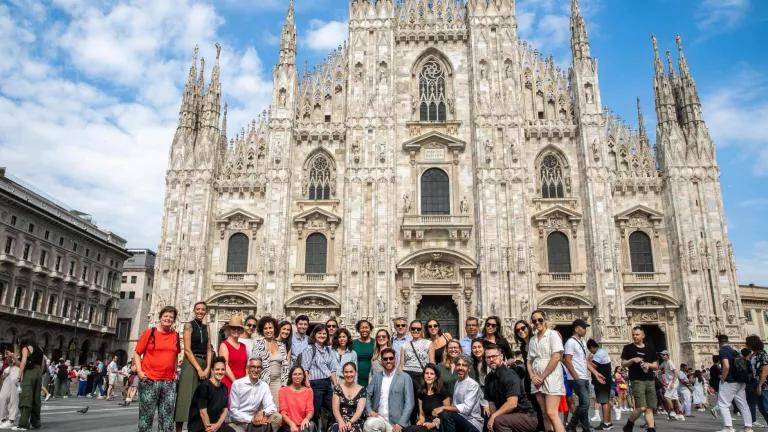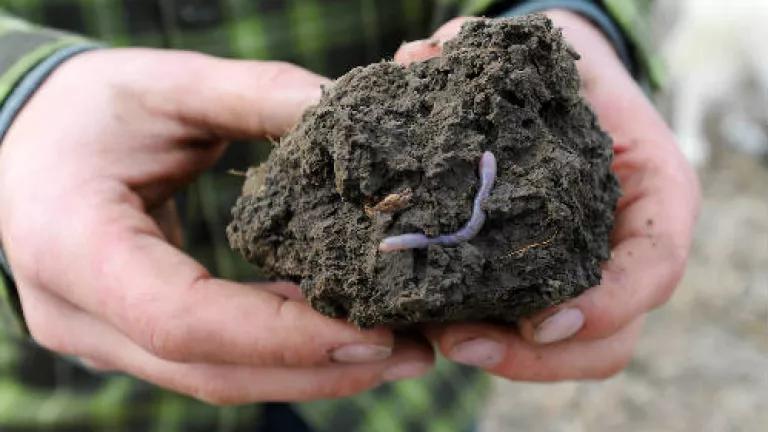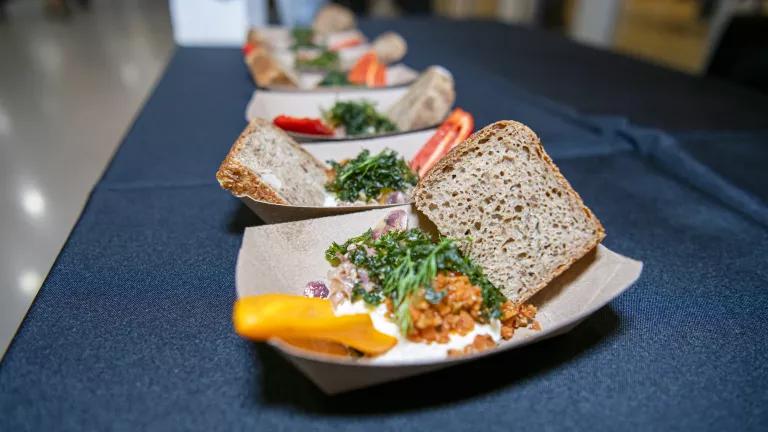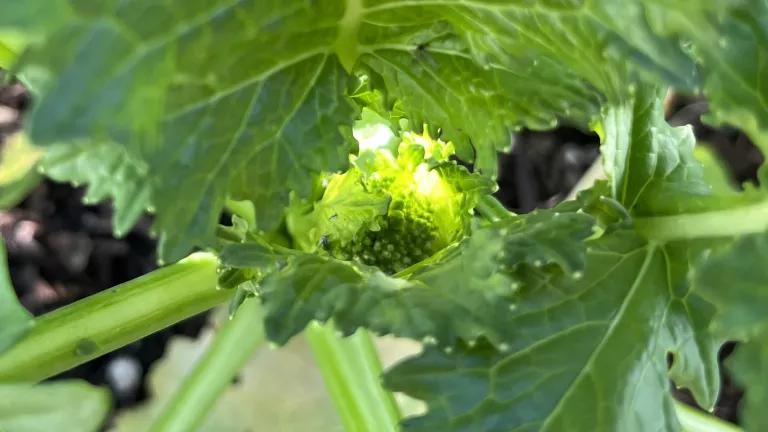Lessons from the Field: Milan’s Food Waste Hubs
Replicating international solutions for food waste reduction across cities

International city delegates and partners during the Milan Food Waste Hub Study Tour 2023
Devid Rotasperti for Bloomberg LP
Thank you to staff from Bloomberg Associates and C40 for contributions to this blog post.
Successful city projects to reduce food waste abound and visiting those projects provides ample opportunities for cities to learn from peers, build strong relationships, and share best practices. One such opportunity was a recent Milan Food Waste Hub Study Tour in which Bloomberg Associates, C40 and NRDC joined a delegation of ten cities from Europe and the United States committed to reducing food waste.
Nominated by C40 in 2019, Milan won the Earthshot Prize for their innovative Food Waste Hub model. As part of Mike Bloomberg’s role as Global Advisor to the Earthshot Prize winners and Bloomberg Associates’ long-standing support of the City of Milan’s sustainability programs, Bloomberg Associates teamed up with C40, the City of Milan and NRDC to conceptualize and organize a Study Tour convening a group of cities in Milan to experience the model first-hand. Cities that have been working on various food waste reduction initiatives benefitted from a full-day workshop, hosted by Bloomberg LP’s Milan office, to develop targeted food waste action plans.
Convenings and on-the-ground tours provide a new way of looking at our field of study by getting out of our routine and creatively approaching the topic in new surroundings. By bringing cities together to see the programs and infrastructure of another leading city, we can examine what is working well in our own backyards. Seeing directly how the city of Milan addresses food waste reduction and food access provided new insights into the barriers that other cities are facing and how to overcome them.
About the study tour
Over the three-day tour, participants learned first-hand how Milan is addressing wasted food through a mixture of site visits and in-depth conversations with local stakeholders while also fostering opportunities for engagement, relationship building, and problem solving across cities.
Milan’s hub system consists of a robust non-profit ecosystem which increases residents’ access to food through four distinct social markets across the city, with two additional hubs soon to be added. Via points on a food card, families can shop at the social markets, giving them the benefit of choosing their own items and reducing the stigma commonly associated with food aid. The hubs rescue food from supermarkets, restaurants, and corporate canteens and distribute it to residents experiencing food insecurity; the fifth hub consists of a cold storage locker at the wholesale market to facilitate redistribution of imperfect, damaged, or unsaleable produce to the social markets. Collaboration across the hubs allows for the improvement of logistics and reduction of costs. Similar efficiencies are found in the city’s centralized kitchens serving school meals and home delivery to elders while sourcing locally, certified organic, plant-based with very little waste.
Families visiting the hubs access social services like childcare and job training, in addition to food aid. A key vision of these hubs is that they are not only solutions to food insecurity across the city, but a support system for people as they work to reintegrate into the food economy by getting support on key social services.
The program won the Earthshot Prize in 2021, which recognizes and helps scale extraordinary solutions to the world’s greatest environmental challenges. Touring cities were selected based on their ambitious action to address food loss, food waste and food insecurity and to reduce GHG emissions.
City of Milan’s global leadership on urban food policy
The tour was co-hosted by the City of Milan as part of the Milan Urban Food Policy Pact (MUFPP). The Milan Pact is a framework for defining and taking action on urban food policies including good governance, sustainable diets, food production, food distribution, and food waste. A primary goal of the MUFPP is to assess and monitor food loss and waste at all stages of the city region food supply chain and ensure holistic planning and design, transparency, accountability and policy integration. Nearly all of the participant cities have signed onto the Pact.
Drafting food waste action plans
The tour was more than just an information sharing opportunity; each city assessed how it can replicate, scale or adapt lessons learned in Milan to their local context. To close out the tour, the City of Milan led a workshop to walk cities through the development of a food waste action plan. The workshop was developed as part of the Food Trails project – a 4-year EU funded project aiming to translate the MUFPP’s collective commitment into measurable and long-term progress towards sustainable food systems through development of helpful tools and guides for cities. Several cities left the workshop with tangible next steps for implementing key project ideas found in the Milan Food Waste Hubs which could be replicated to inspire action at home.
Tour takeaways
- Cities tackle similar issues: Although cities across the US, Europe, and the world face distinct challenges, they also share common opportunities. Cities across the globe are actively seeking ways to reduce food waste and improve food access for their citizens. Milan’s hubs play a pivotal role in advancing efficient and dignified solutions to food access issues. By observing and learning from such models firsthand, other cities can gain insights into successful practices.
- Global lessons enable local solutions: By stepping outside of geographic and political boundaries and looking beyond their own neighbors, cities can draw inspiration from diverse perspectives and approaches. A global perspective can enable cities to discover innovative and creative solutions that they might not have considered otherwise. Global perspectives can help to challenge conventional thinking and be adapted into transformative local solutions.
- Convening facilitates replication: Cities that have successfully modeled food waste reduction at the household and restaurant level, for example, can share seeking to achieve similar results. The process of convening with peers to discuss these solutions allows cities to adapt and tailor them to their specific local contexts, fostering collaboration and knowledge sharing within and between urban areas.
- A dignified food access model requires a comprehensive approach: At the hubs, the primary focus is on providing a dignified and integrated option for food-insecure families to access food and other vital social services, with food waste reduction as a secondary benefit. By supporting and replicating holistic approaches that encompass not just food rescue and food waste reduction but also social and economic support services, we can work towards integrated solutions that can help to break the cycle of food insecurity and promote self-sufficiency while simultaneously providing environmental benefits.
Next steps
The study tour was just one opportunity to exchange knowledge between cities and the work will continue in many forms. Cities and partners can maximize the impact of the tour by expanding the information sharing to more cities across networks. Online platforms, conferences, and workshops provide excellent opportunities for shared learning to reduce waste and build a more sustainable and equitable food system with nodes across continents. Cities will further their efforts by engaging with established networks and organizations like the Milan Urban Food Policy Pact (MUFPP), NRDC’s Food Matters initiative, and C40 Cities’ Food Systems Network and Good Food Cities Accelerator. NRDC’s Food Matters project will continue work with the delegation on implementing components of their food waste action plans. C40 will continue supporting participating cities with this work and will be offering a new series of webinars through its Food Waste Action Lab in the second half of 2023. By collaborating with each of our organizations, cities can tap into a wealth of expertise, resources and experience in guiding cities into a sustainable future.

City delegates draft food waste action plans
Andrea Collins/NRDC

Participants visit the Foody Wholesale market in Milan
Andrea Collins/NRDC

Visiting the Solidando Food Waste Hub
Devid Rotasperti for Bloomberg LP.





